The allure of crafting bespoke software solutions tailored to your unique needs can be enticing in this dynamic world of business. However, the journey of in-house software development is often riddled with hidden costs.
From unexpected delays to escalating maintenance costs, the financial implications of in-house software development can quickly spiral out of control.
This blog post will make you dive into the labyrinth of in-house software development costs, the financial oasis that outsourcing promises and why prefer software developer for hire.

An Overview of Software Outsourcing & its Advantages
Software outsourcing is defined as the practice of hiring external teams to develop your software applications or leverage related software development services.
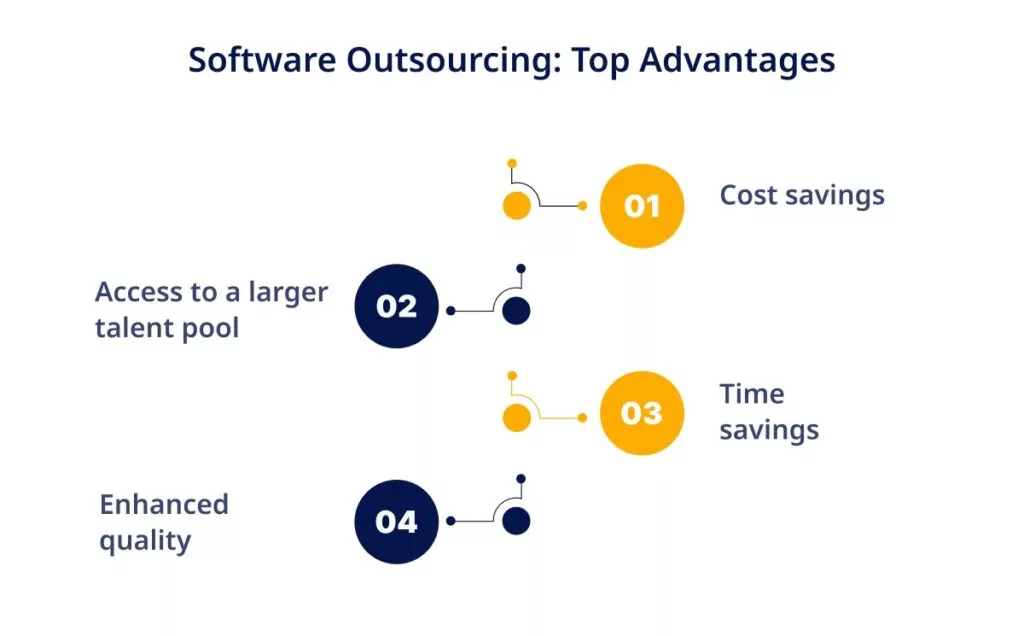
It offers several advantages over in-house development as discussed below:
Cost savings
Software outsourcing allows businesses to leverage the expertise of external providers who already have the necessary resources and infrastructure in place.
Access to a larger talent pool
Software outsourcing provides access to a diverse range of expertise and experience that may not be available locally.
Time savings
External software development providers are often specialized in specific technologies or industries and deliver projects more efficiently.
Enhanced quality
Software outsourcing brings fresh perspectives and innovative ideas to the table, which can lead to better solutions and ensure that the software meets the highest standards.
Exploring the Hidden Costs Associated with In-House Software
Hiring & Recruitment Costs
Finding the right candidates for the custom software development team can be a challenging task. It often requires a significant investment of time and effort to identify individuals with the necessary skills, experience, and cultural fit for the company.

The hidden cost involved in this:
- Expenses involved in advertising job postings on various platforms to attract qualified candidates.
- Conducting interviews is another expense to consider.
- Conducting thorough background checks can be time-consuming and may require additional expenses
- High turnover rates in the software development
Considering the above factors, it becomes evident that the hiring and recruitment costs associated with in-house software development can be substantial.
Exploring alternatives like software outsourcing can help mitigate these hidden costs and provide access to a pool of skilled professionals without the need for extensive recruitment efforts.
Training & Onboarding Expenses
When a novice developer joins your team, they do not just start coding on day one. They first need to understand your company's unique business processes, the specific tools you use, and the particularities of the project they will be working on.
This learning curve can be steep and time-consuming, leading to substantial costs that are often overlooked.
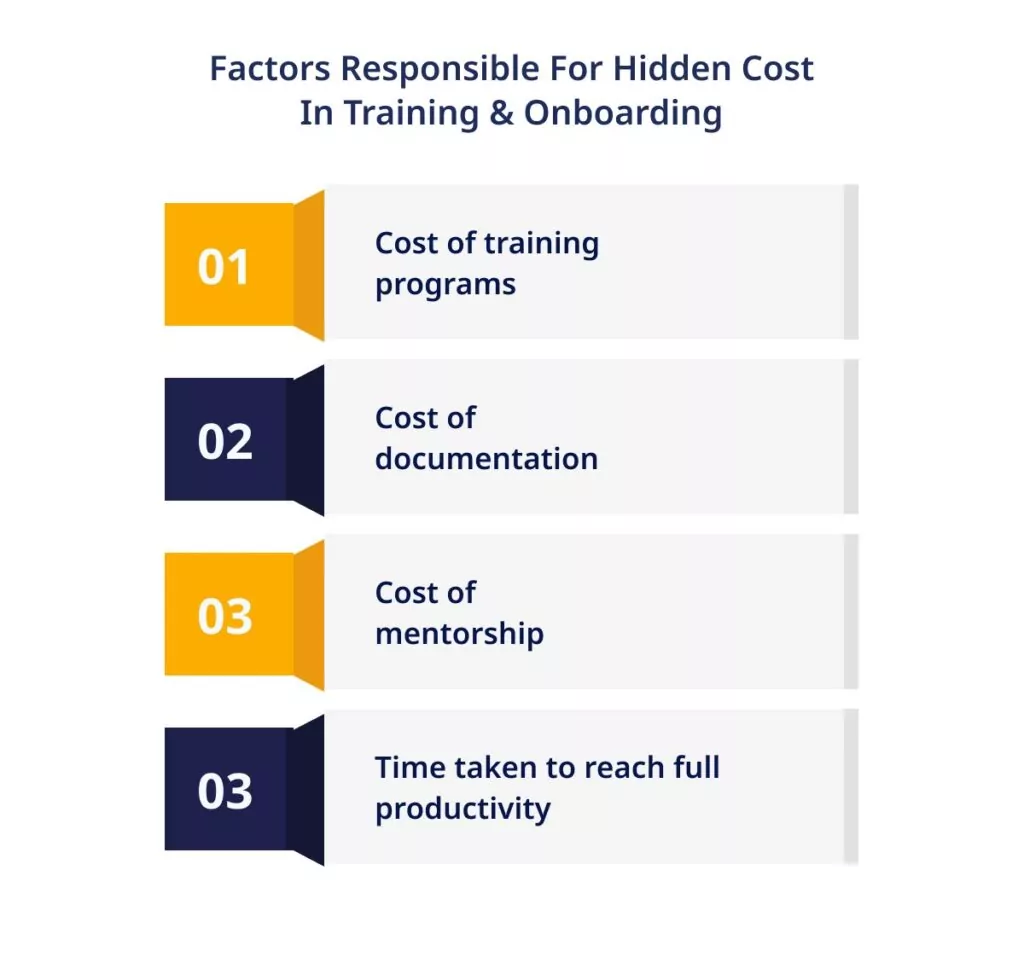
The hidden costs associated include:
Cost of training programs: Depending on the complexity of your software and the experience level of the developer, these training programs can range from a few days to several weeks.
Cost of documentation: Creating and maintaining this documentation is a time-consuming task that requires significant resources.
Cost of mentorship: The senior mentorship to new developers is invaluable for the new hire, but it also takes time away from the mentor's own tasks, leading to a decrease in overall productivity.
Time taken to reach full productivity: It can take weeks or even months for a new developer to become fully acclimated and reach their peak productivity.
Hence, training and onboarding expenses can significantly increase the overall cost of in-house software development, making software outsourcing a more attractive option for many businesses.
Infrastructure & Technology Investments
Infrastructure and technology investments, continuous upgrades and maintenance, expertise and training, and opportunity costs are all factors that can significantly impact a software development company's bottom line.
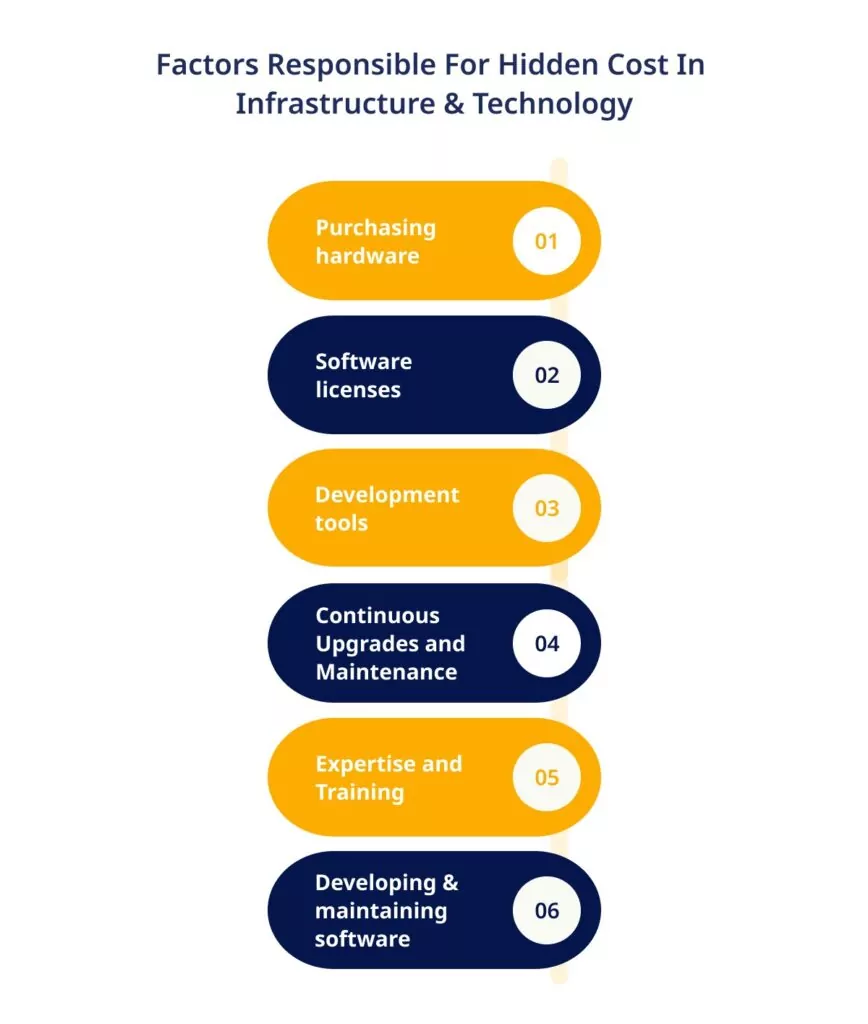
The significant expenses involved in the infrastructure and technology investments:
- Purchasing hardware
- Software licenses
- Development tools
- Continuous Upgrades and Maintenance
- Expertise and Training
- Developing & maintaining software
Outsourcing software development can provide a cost-effective solution, allowing businesses to leverage external expertise while focusing on their core competencies.
Project Management & Coordination
Developing software in-house requires a dedicated team of project managers, team leads, and administrative staff to oversee and coordinate projects effectively. These individuals ensure smooth communication, task allocation, and meeting project milestones.
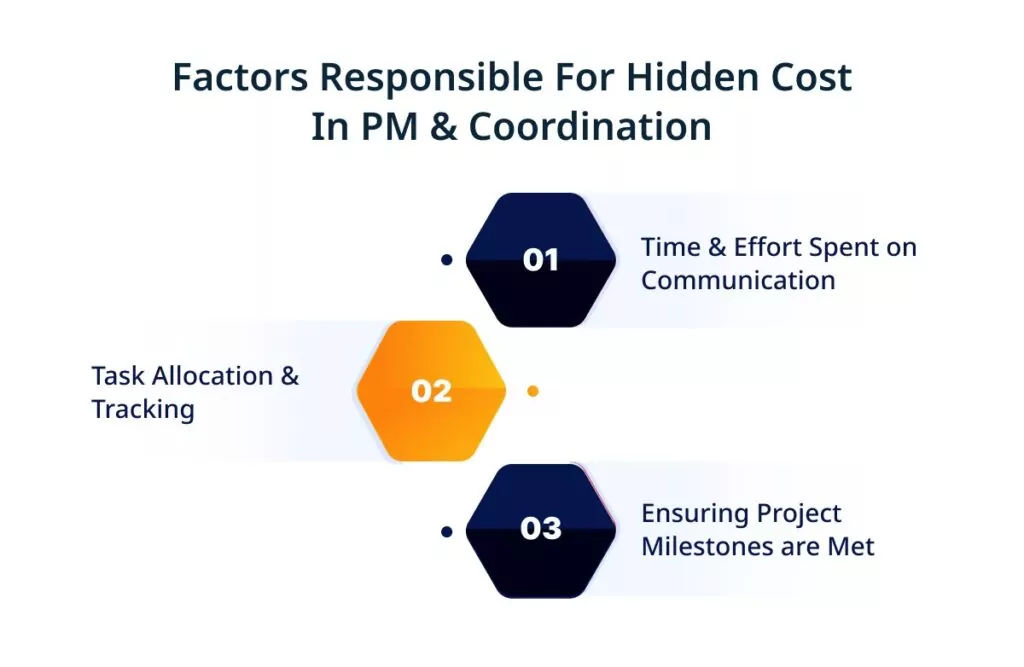
Time & Effort Spent on Communication: In an in-house setup, coordinating meetings, providing progress updates, and addressing queries and concerns can be time-consuming, leading to increased costs.
Task Allocation & Tracking: Project managers/team leads invest significant time and effort in ensuring that tasks are appropriately distributed, deadlines are met, and any bottlenecks or issues are addressed promptly.
Ensuring Project Milestones are Met: This involves monitoring progress, identifying potential risks or delays, and taking corrective actions to keep the project on track.
Hence, software outsourcing can provide a cost-effective solution, allowing businesses to leverage external expertise and streamline project management processes.
Opportunity Costs & Time Constraints
For Opportunity Costs:
Developing software in-house requires allocating valuable time, manpower, and financial resources. This diversion of resources may take away attention from core business activities, such as marketing, sales, and customer support.
As a result, businesses may miss out on potential market opportunities or fail to meet customer demands effectively.
For Time Constraints
Developing software from scratch requires significant time & effort, from planning and design to coding and testing. This time constraint can have a direct impact on product launches and market competitiveness.
Delays in custom software development can lead to missed market opportunities, allowing competitors to gain an edge and potentially resulting in revenue loss.
In-house software development may introduce delays due to various factors, such as resource limitations, technical challenges, or unexpected roadblocks.
These delays can have a significant impact on product launches, potentially resulting in missed market windows or the release of products with reduced features or quality. Such compromises can harm the company's reputation and customer satisfaction.
Maintenance & Support Expenses
One of the significant hidden costs of in-house software development lies in the ongoing maintenance and support expenses.
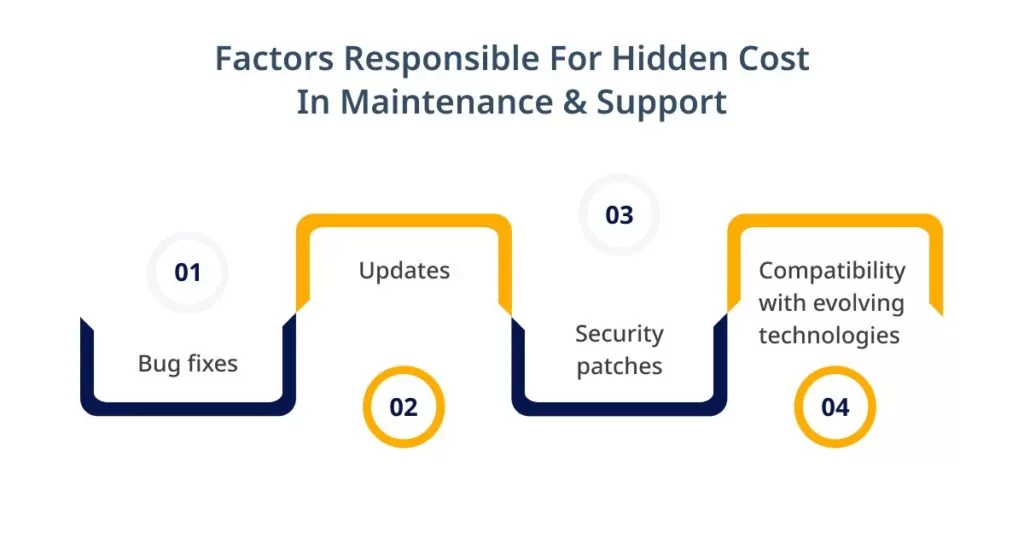
Software, once developed, requires continuous attention to ensure its smooth functioning. This includes:
- Bug fixes
- Updates
- Security patches
- Compatibility with evolving technologies
Allocating resources and time to address these maintenance needs can be a significant ongoing expense for businesses.
In addition to maintenance, in-house software development also entails providing user support.
Users may encounter issues, have questions, or require assistance in using the software effectively. This necessitates the availability of a dedicated support team or personnel to address user queries and provide timely resolutions.
So, establishing and maintaining a support infrastructure can add to the overall cost of in-house software development.
Conclusion
So far we have seen that in-house software development may initially seem like an appealing choice, but it is crucial to consider the hidden costs that can arise.
From infrastructure investments & project management complexities to opportunity costs and ongoing maintenance expenses, the financial implications can be significant.
Businesses can mitigate the above-discussed hidden costs & gain access to specialized expertise, scalability, and cost savings by opting for software outsourcing or you can hire dedicated developers from top companies. Another viable option is to explore dedicated development team services, which offer a balanced approach between in-house and outsourced development, providing you with a team that can focus solely on your project.
Outsourcing software development allows businesses to focus on their core competencies, seize market opportunities, and ensure timely product launches. Ultimately, making an informed decision about software development can lead to long-term cost-effectiveness and business success.

